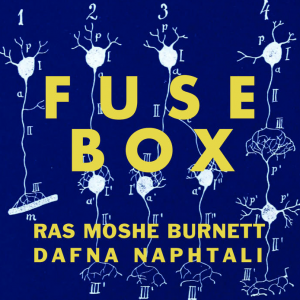by Daniel Galow, special to the Sybaritic Singer
Fusebox is a fitting title for the new album by saxophonist Ras Moshe Burnett and vocalist/electronic musician Dafna Naphtali. There is always a point of connection between the two performers, even when they are deliberately ignoring or playing against one another. The dynamic, complex interactions that occur in the music they make together are evidence of their strong partnership as musical collaborators.
A Unique Approach
One element of the album that immediately stands out is the mix; often the two dry signals will be panned off to the side to make room in the stereo field for the wild, spacey effected sounds being manipulated live by Ms. Naphtali. This allows for the exploration of a wide dynamic range and bold contrasting timbres from both performers. The choice to process Mr. Burnett’s tenor saxophone in tandem with Naphtali’s own voice also creates fascinating moments of tension and release, placing short loops in larger contexts as in the opening track Hall of Mirrors. The two performers play off each other well no matter what kind of material they are working with; glitchy percussive jump-cuts are navigated with the same ease and attention to detail as long-form modal explorations.

This duo’s unique improvisational style touches on elements from a wide range of influences. Track 5, Short Fuse, is a pointed dialogue with Naphtali reacting to Burnett in ways that are reminiscent of other great improvisers such as Ikue Mori or Charmaine Lee. Track 8, Dervish, leans into the groove of made up of tight percussion and delayed saxophone loops and sounds like it would fit right in on a Flying Lotus album. There are many unexpected surprises to be discovered as well; the processed “shhhh” sounds on the track Two Equals Free are sometimes suggestive of a snare drum. Hearing something totally unique is one of the most rewarding aspects of listening to improvised music, and this album exceeds expectations.
Transcending Limitations
Making beautiful music with the human voice involves so much more than simply delivering the musical material through the vehicle of a text. On this release Naphtali opts for a more organic approach, never sticking to any particular words but instead moving between different types of sounds such as phonemes, tongue clicks, and various consonants in order to best accompany Burnett or stand out on her own. In choosing to use her voice in this way, Naphtali can fluctuate rapidly between roles as foreground, background, percussion, texture, noise, or any combination of elements. Augmenting her formidable vocal talents with live processing adds another layer of depth and beauty to her improvisation.
Being an improvising saxophonist in the 21st century comes with a fair amount of baggage; wrestling with imposter syndrome and dealing with the aesthetic dilemma of “How and where can I fit in/stand out?” are not easy tasks. As a performer, Ras Moshe Burnett displays a level of commitment, immediacy, and fearlessness that embraces tradition while staying true to his own principles. His phrasing always suits the situation, like a poet whose syntax is chosen as carefully as it is cleverly. Some of his more introverted moments on tracks such as Astrocyte occupy a similar space as Pharoah Sanders on his recent album Promises, a collaborative effort between Sanders, electronic music producer Floating Points, and members the London Symphony Orchestra. Burnett’s command of melody is evident, but his pyroclastic outbursts on tracks like Dervish and Coded Futures are just as powerful, coming it with just the right punchy statements at exactly the right times. His sense of pacing is especially strong when he is responding to other material; the track Two Equals Free sees him trading sequences with Naphtali to contribute to a larger whole of processed sounds. Burnett navigates any musical situation with grace, edge, and skill and is an artist to explore further with future releases.
Improvised music is one of the most misunderstood genres, often derided as inaccessible, grating, or unmusical. But as with all music, great risks can yield great rewards in the right hands. The hard work that went into crafting this music is evident in every note; it should be explored and enjoyed by anyone with a sense of adventure. Ras Moshe Burnett and Dafna Naphtali’s album Fusebox stands as a dynamic and powerful exploration of what great improvisors can do.

Daniel Galow is a saxophonist, composer, and electronic musician from New Jersey. His music balances strictly notated material with flexible or completely improvised passages, giving performers a challenge while still allowing them interpretational freedom. His interests outside of music include playing chess, going to museums, and skiing.
